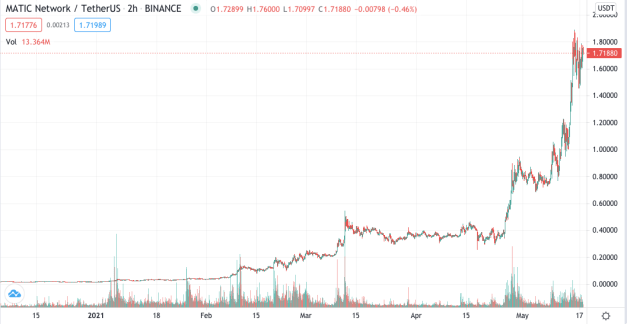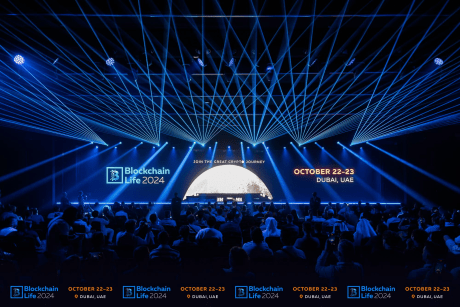Dapps are continuing to shine recently. As if the chart wasn’t enough to convince you, $MATIC has been a star performer too. Data released this week from DappRadar shows a substantial uptick in Polygon-based decentralized applications. This follows our piece from just a few weeks ago, highlighting $MATIC’s big rally. Let’s recap some of DappRadar’s findings.
The Polygon Network
The shows a number of metrics worth calling out with regards to the second-layer solution to Ethereum. It starts with calling out nearly $1B in value flows through their layer 2. Additionally, the materials note that the top twenty Polygon dapps interacted with more than 75,000 active user wallets in just the past week. Finally, in the past month, Polygon-tracked dapps on DappRadar increased from 61 to 93; 46 of those fall in the DeFi and Exchange categories.Related Reading | Polygon Expands NFT & DeFi Ecosystem With Trace Network
Polygon’s Pitch Point
As the DappRadar materials point out, there are a couple sticking points for Polygon that are main drivers for it’s reason emergence: lower gas fees, and fast transactions. It’s not surprising to see slowing motivations for DeFi applications recently. However, unlike other Ethereum-based ecosystems, $MATIC looks to bring other advantages to the table too. Major pitch points include validation system security, scalability by way of joint PoS consensus and Heimdall architecture, and PoS chain Plasma. Major competitors include Polkadot ($DOT), Cosmos ($ATOM), and Avalanche ($AVAX). Polygon’s leading dapps in DeFi include QuickSwap, Aave, and ParaSwap – Aave made the expansion over to Polygon in March. QuickSwap reported a 210% user increase last week, and a 240% increase in transactions over the same period.
$MATIC has been performing exceptionally well this year | Source:
Exposure & Expansion
Projects and platforms continue to assist $MATIC with recent growth. Recent partnerships include Decentraland and Maker, and recent platform support includes Coinbase and Binance. Additionally, the team announced Tether (USDT) and USDC integration in September last year. Other unique engagement has taken place in the network as well, such as COVID-19 test verification used by government officials in India.It’s not just $MATIC seeing rapid growth, either. DeFi is arguably undergoing a radical transformation, as we highlighted recently.
$MATIC launched in 2017 and moved to mainnet by the end of the year; the network went through the Polygon rebrand just a few months ago. $MATIC has now surpassed a $11B market cap and has cracked the top 25 of top coins per market cap, according to CoinGecko, hitting record-high price and coming close to $2 this week.Related Reading | How Aave’s Integration With Polygon Will Maximize Users’ Profits
Featured image from Pixabay, Charts from TradingView.com












